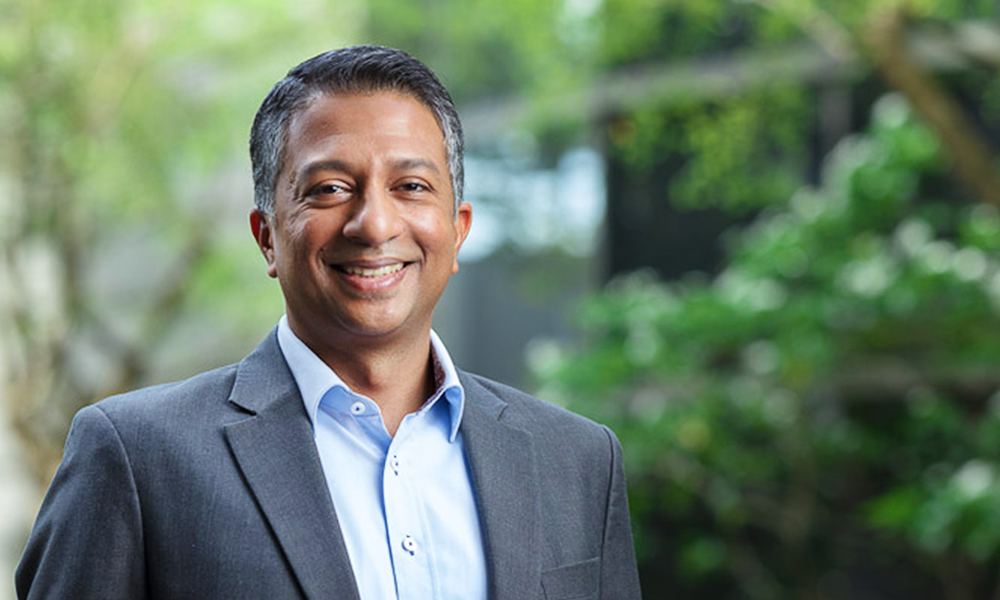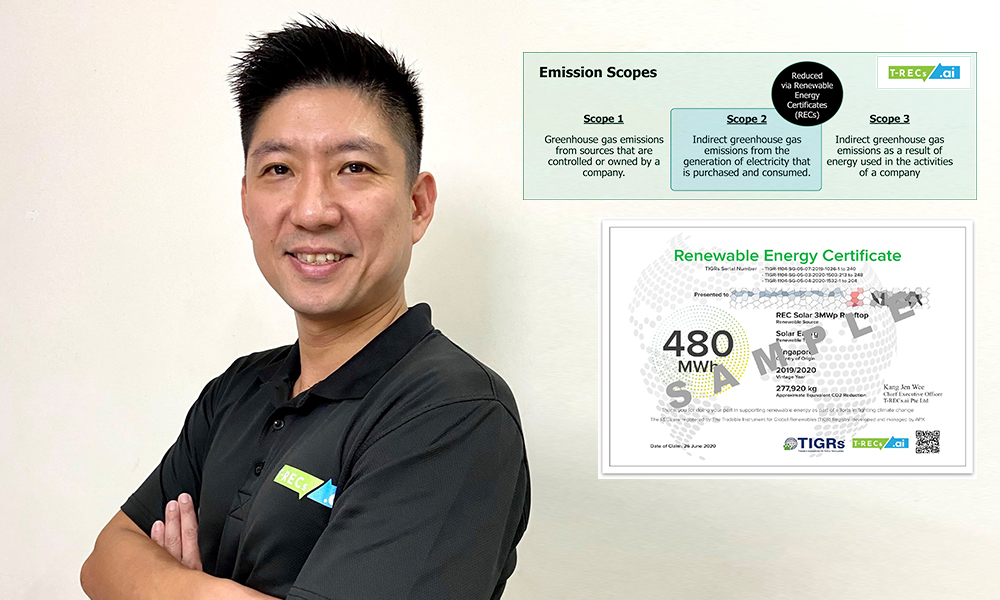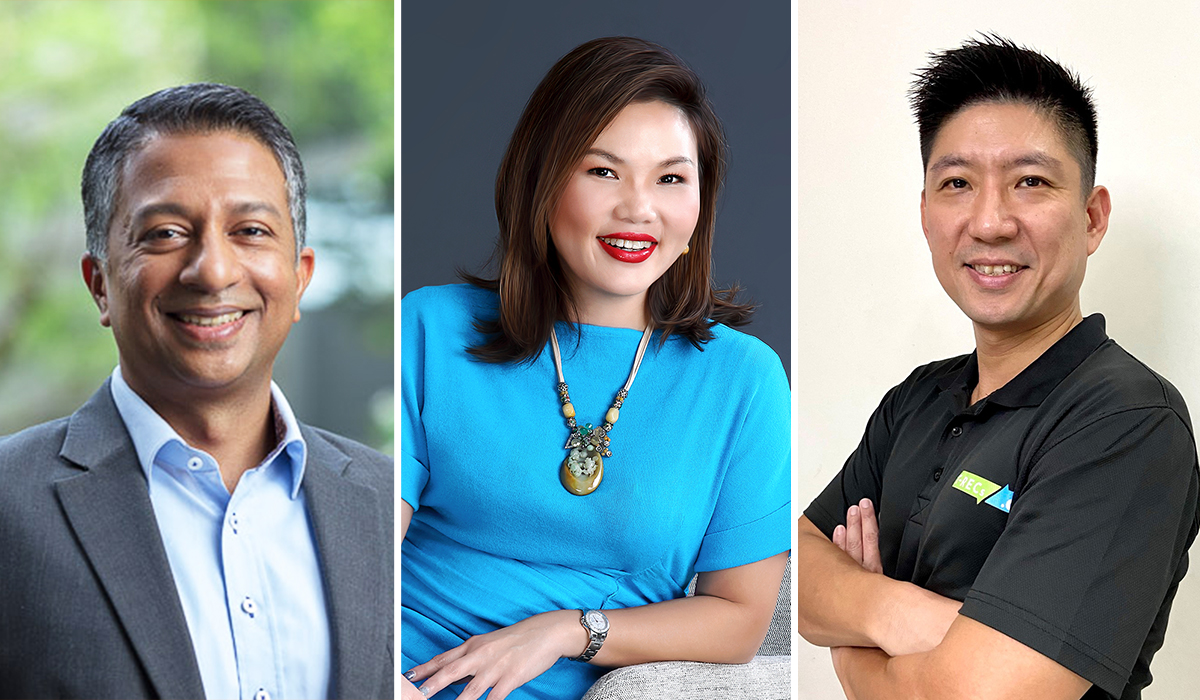Left: S Harsha, Managing Director, Singapore Market, Sustainable Energy Solutions at SP Group.
Middle: Ellen Teo, CEO of Union Energy Group
Right: Jen Wee, CEO of TRECs.ai
SP Group Leads the Way in the Sustainability Push
When talking sustainability in the local context, SP Group is definitely leading the way. The company is known for its suite of eco-friendly energy solutions for Singapore and the region.
But never one to rest on its laurels, S Harsha, Managing Director, Singapore, Sustainable Energy Solutions at SP Group, was energetic in his emphasis on sustainability as a central pillar of SP Group's long-term strategy.
He was happy to speak with us on the low carbon, smart energy future SP Group envisions for Singapore and the region, and how youth movement can become the key driving force of change.

S Harsha is the Managing Director, Singapore Market, Sustainable Energy Solutions at SP Group.
To start with, why should we care about sustainability?
Sustainability is about meeting our present needs and enabling the ability of future generations to meet theirs. Individuals, companies and governments must take positive and urgent action to mitigate and reverse the degradation of our natural resources or, simply put, life on earth as we know it will be at risk.
That's a terrible future to think of! What is SP Group doing about it?
It cannot be us alone, collective action is required to urgently address our most imminent global challenges.
That said, we are proud to play a vital role safeguarding Singapore's electricity supply for the future. To ensure we remain future ready to support Singapore's sustainable growth, the key drivers of our energy future are decentralisation, decarbonisation, digitalisation, and electrification.
Decentralisation, innovating and upgrading our network technology to support the increase of renewable energy sources for a greener energy mix; decarbonsation, improving energy-efficiency, reducing electricity consumption and increasing clean energy sources towards reduction of our carbon footprint; digitalisation, harnessing the power of digitalisation to enhance the reliability and resilience of our network; and electrification, proactively investing in and leveraging smart energy solutions to enhance our grid's capacity for renewable energy sources.
Can you tell us about some notable sustainable energy projects you were involved in?
Certainly. We have pioneered many low carbon, smart energy solutions in Singapore. These include district cooling and heating, integrated renewable energy systems, electric vehicle charging infrastructure and digital products that are tailored for commercial and industrial facilities, townships and districts, campuses and homes.
Could you go in-depth into one of these projects, and tell us the challenges SP Group faced in the implementation and how you overcame them?
Our work in Tengah in close collaboration with HDB comes to mind. It offers a unique opportunity for us to amalgamate all of SP's capabilities and create a reference architecture for a sustainable township.
Our primary remit for the township is to deploy a residential version of the District Cooling System - the Centralised Cooling System (CCS). With completion coming up in phases from 2023, Tengah residents will soon enjoy the first large scale, public residential centralised cooling system in Singapore that is expected to help Tengah achieve 30 GWh/year in energy savings. This corresponds to avoiding carbon emissions from 4,500 cars on the roads. With CCS as an anchor, we integrated a variety of other solutions such as solar panels and EV charging, data platforms and digital technologies to transform Tengah into an eco-friendly, smart energy town. The technical and project team worked very closely with HDB and our partners throughout the design process to overcome operational challenges and meet efficiency and sustainable outcomes.
As you know, BrightSparks is a youth-oriented publication and many youths are very socially aware and devoted to environmental causes. Why do you think youths should think more about energy sustainability?
Going sustainable requires both urgent action and long-term commitment from everyone in the society. Youths have tremendous potential in leading the gravitational shift towards safeguarding our global commons, forging an equitable society based on sustainable growth.
As positive change agents, it is very important for our youths to believe in and be the future they wish to see, and any cause is a meaningful cause.
Lastly, what would you say to convince someone that they should adopt a more sustainable lifestyle?
The answer to this question lies in a quote from Mahatma Gandhi: "The earth provides enough to satisfy every man's needs, but not every man's greed." Sustainability means meeting our own needs and enabling the ability of future generations to meet theirs. We should not be creating problems for our children and future generations to solve, but a better future for them to enjoy.
A Solar-Powered Future at Union Power

Ellen Teo established Union Power in 2017, and is also CEO of Union Energy Group, Singapore's major provider of liquified petroleum gas and multi-energy fuel sources.
Ellen Teo, CEO of Union Power, believes that any business should try to be sustainable not just economically, but environmentally as well. She envisions a Sustainable Singapore where we no longer have to worry about how global warming affects our future generations.
We were honoured to have a chance to chat with her about exactly what Union Power is doing to bring about such changes, and her take on our sustainability future.
To begin with, tell us in your words what is Union Power.
Union Power is an Electricity Retailer licensed by Energy Market Authority (EMA) and a member of Union Energy Group (UEG).
How does Union Power contribute to sustainability in Singapore?
Last year, we witnessed the effects of climate change as the world took a breather during pandemic. So, we took the opportunity to look into clean energy and accelerated plans for developing solar energy through our solar arm, Union Solar.
Through Union Solar, we manage a network of solar photovoltaic (PV) installations that power homes and businesses. We finance and install solar PV systems on building rooftops, converting unused space into clean energy generation that produces sustainable, renewable energy.
Why solar energy?
Solar energy in Singapore is one of the most cost-effective and environmentally friendly energy sources available to a developed country. Solar panels in Singapore can save up to 40% on energy costs when compared to brown energy.
Deployment of solar energy in Singapore can be a challenge, however I believe that every obstacle is an opportunity to progress, and Union Energy Group seeks to become one of the primary drivers of solar energy adoption through Union Solar.
We see ourselves as an agent of change to move towards a carbon-neutral society.
What are some challenges you faced, convincing businesses and homeowners to switch to Union Power? And how did you overcome them?
We found that when organisations rejected our proposals, it was mostly because they were deterred by the high investment upfront in order to reap savings in the long run.
Even though Union Power is a relatively new subsidiary of Union Energy Group, we were able to leverage on our long-time relationships with LPG consumers to offer the most competitive tariff rates, attractive bill rebates and promotions. We also placed a premium on providing a pleasant consumer experience. As we made the switching process easy, more consumers decided to make Union Power their energy provider.
Our efforts have paid off, and we consistently clinched a 4-star rating on EMA's Consumer Satisfaction Survey (CSS), with a 93.5% customer retention rate.
So, does using Union Power mean that I'm making a more environmentally conscious choice?
In my opinion, just using Union Power does not mean you are being more environmentally conscious. There are many ways one can change consumption habits to be environmentally responsible.
However, you can be sure that Union Power's beliefs and the way we conduct business is in line with Singapore Green Plan 2030. We constantly advocate that businesses and consumers alike adopt solar energy as a viable alternative to fossil fuels. Our Solar PV system installations not only provide households and businesses with cleaner energy, but yield immediate cost savings in the energy bill!
In that case, what would you say to convince someone that they should adopt a more sustainable lifestyle?
Temperatures in Singapore will only rise - science shows we need to reduce greenhouse gas emissions by 45% by 2030 - and to net zero emissions by 2050 in order to have a fighting chance of limiting global warming to 1.5°C.
To limit the rate of global warming, we need to ramp up our efforts in sustainable living and to progress with changes to our individual lifestyles. Everyone has a part to play.
As Robert Swan said, "The greatest threat to our planet is the belief that someone else will save it." We should all play our part: I advocate an "attitude reset" wherein we ask ourselves how we can all contribute in our own ways to drive sustainable living.
However, when it comes to sustainability, it tends to be shunted to just one of many causes individuals can take up. Why do you think people, and youths in particular, should focus on energy sustainability above other issues?
In a developed nation like Singapore, we have access to resources and materials and as a result, can impact our environment. Hence, sustainable living should be our top priority as we can affect lasting change.
Sometimes, energy sustainability gets de-prioritised as its effects are not immediate. But that neglects the huge role it plays in combating the rapid rise of global warming. Making the switch to sustainable energy greatly reduces the carbon footprint and greenhouse gas emissions we produce.
Energy sustainability is definitely something we should sit up and take more seriously!
Lastly, give us a tip on how to live more sustainably!
Every journey begins with a single step, start by making small changes to your lifestyle. Switch off the lights and resources once you leave the room, use environmentally friendly materials wherever possible, make lifestyle changes in the way we commute, and adopt the use of renewable energy.
There are so many aspects of our lives that we can change in order to help save the planet, all it takes to get started is a little initiative.
Democratising the REC market with TRECs.ai

CEO of TRECs.ai, Jen Wee, is passionate about sustainable living and it shows in his work opening up the market through RECs.
Photos from TRECs.ai
The ideal sustainable future is one where anybody can reduce their carbon footprint as much as possible. But the nuts and bolts of executing this dream can be complicated, involving complex supply chains and logistical feats. Most of all, we fear that companies are simply talking CSR, without doing any CSR – and want to know who to trust.
That's what TRECs.ai is here for. It does this by making a company's sustainability commitment transparent and trustworthy with its Renewable Energy Certificates (RECs) available on its proprietary platform (REHash) powered by block chain technology and artificial intelligence.
CEO Jen Wee spoke with us about this integral step in creating a more transparent, environmentally-friendly corporate environment, where "green" is part of daily operations everywhere.
Let's dive in. What are RECs and how do they work?
In a nutshell, RECs are used to track and validate the production of 1 MWh (megawatt hour) of renewable energy by any renewable source (Solar, Hydro, Wind).
Traditionally, solar panels were installed on roofs, minimising dependency on the electricity grid and reducing CO2 emissions. However, roof space is limited – so an organisation rarely can claim to be 100% powered by the solar energy it harvested.
But good news! There is an existing framework practiced globally enabling you as the consumer to use renewable energy without physically harvesting and then consuming it. With every 1MWh of "dirty" energy you consume, you can purchase 1MWh of renewable energy (represented by a REC) produced in another location.
Using this framework, you can be 100% carbon neutral in your consumption.
TRECs.ai is credited with democratising this market. How is it doing this?
The traditional RECs market was restricted to big buyers and big sellers via brokers. Smaller buyers and sellers were hence unable to enter this market due to their size.
T-RECs.ai REHash marketplace allows small sellers to register assets at a fraction of the cost due to the technology we deploy. Being a trading platform with our proprietary matching engine, we are able to match any volume of buy/sell orders. In this way, we democratise the RECs market by enabling everyone to be able to participate.
So with TRECs.ai's platform, any player can enter the clean energy market. How does this support sustainability?
Essentially, an REC is a statement that declares a company's carbon-free status. So this naturally leads to issues of claiming and reporting.
The solution is to make the entire transaction flow of REC from generation to retirement 100% transparent. In this way, there is zero chance that there will be fraudulent claims and green-washing, like how many oil and gas companies are challenged when purchasing carbon credits that are not tracked.
That clearly shows how vital transparency is in the sustainability market. Where do you see TRECs.ai going from here?
We have built really good momentum and have onboarded very strong global clients to our platform. We expect to see very strong demand within the next 12 months, and are positive about achieving our goal to be Asia largest RECs trading marketplace within three years.
On a broader level, what does a Sustainable Singapore mean to you?
Singapore is very small, and our overall carbon emissions are low as compared to many parts of Asia since we are burning gas instead of coal.
Hence, we should be taking the lead in supporting our neighbours (with our technology and knowhow) and helping them to reduce emissions. This should include building solar power plants in our neighbour countries, instead of only focusing on our homeland, which is so, so small.
CO2 is not a Singapore thing. A CO2 molecule produced travels around the world in seven days, so our perspectives should be larger and wider!
Same as we asked Ellen – why concentrate on energy sustainability, when there are many other issues plaguing us?
I am not in a position to determine which issues are more important than others, since everyone looks at things differently.
All I can say is that energy sustainability must be paid the appropriate attention as it has already been shown to have a very clear impact on the current generation. It's not a next-generation issue anymore. If we don't solve it now, we face the consequences.
Jen's Sustainability Tips:
Finish the food you buy
Eat more vegetables and less meat (animals generate a lot of GHG!)
Sleep with fan on, not air-con
Avoid one-off plastics
What would you say to convince someone that they should adopt a more sustainable lifestyle?
It's about getting into the know. Read more. Listen more. Observe more. Then, there's no need for me to convince you, since the evidence shows so clearly that we should start leading a sustainable lifestyle today, so we can even still have a life tomorrow.


